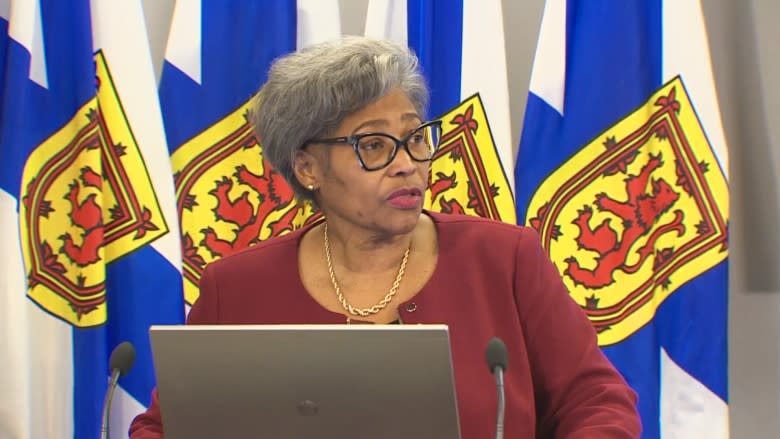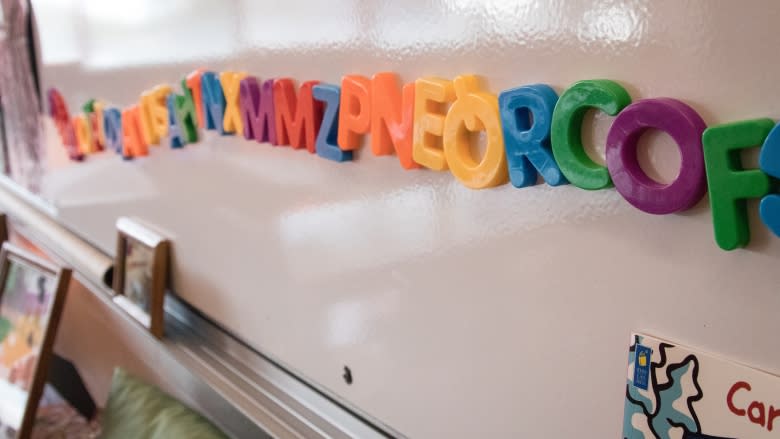Praise and criticism greet sweeping Nova Scotia education report
A new government report is calling for the elimination of elected school boards and for weak teachers to be taken out of the classroom, part of a slate of sweeping recommendations to change the way education is administered in Nova Scotia.
The report was prepared by Avis Glaze, an expert in the field, who was paid $75,000 to study the way the education system is administered in the province and to recommend changes.
"The status quo is not working," she said Tuesday at a news conference to unveil the report, which includes 22 recommendations.
Glaze pointed to national test results that have Nova Scotia students achieving below national standards and near the bottom of the pack when it comes to science, reading and mathematics scores.
"There is no reason why they should be left behind. They are no less bright or no less capable of learning," she said.
But some of Glaze's recommendations are contentions and were denounced Tuesday by the head of the Nova Scotia Teachers Union and the president of the Nova Scotia School Boards Association.
It's still not clear what the McNeil government thinks of the recommendations. Education Minister Zach Churchill did not respond publicly to the report Tuesday, but is expected to do so Wednesday.
The president of the Nova Scotia School Boards Association, Hank Middleton, said he was "shocked" to see the recommendation to eliminate elected boards. He said local board members are a voice for their communities and a check on decisions made by the Department of Education.
"Local school boards hold staff accountable but sometimes we hold government accountable for policies that we don't think are going to work," he told reporters.
Glaze characterized school boards as confused, with unclear roles and responsibilities. She said elected board members are too often acclaimed, turnout for board elections is poor and voters are apathetic.
Her recommendation applies to the province's seven regional school boards, but not the francophone school board Conseil Scolaire Acadien Provincial.
Glaze did not know how much money would be saved through consolidation, although she said it should be redirected into classroom resources.
"Not everybody needs their own IT," Glaze said. "Not everybody needs facilities, not everybody needs their own transportation. Dollars will be freed up from consolidation and that, all that money, must not be used for other projects. It must go back to the classroom."
Although Glaze wants the boards gone, she said superintendents and existing regional administrative structures should live on to handle "day-to-day operations." Superintendents would be renamed regional executive directors and report directly to the Department of Education, through the deputy minister.
In another recommendation that is bound to draw the ire of the Nova Scotia Teachers Union, Glaze suggested school principals and vice-principals no longer be part of the union. This mirrors a recommendation made by a task force created by the McNeil government not long after assuming power.
She also called for the creation of a new licensing and governing body for the teaching profession, a provincial College of Educators. It would be similar to the College of Physicians and Surgeons, which regulates the practice of medicine by doctors.
The aim, according to Glaze, is to take weak teachers out of the classroom and provide them a chance to improve their skills or get rid of those who can't.
"If I had a child in school, I would not want a weak teacher," she said. "You know it is said that children lose up to three to five years by having one weak teacher for a year. So we must make sure that we have good teachers."
Glaze said she "absolutely" agrees there are some Nova Scotia teachers who should not be teaching.
For its part, the Nova Scotia Teachers Union is rejecting the report. Union president Liette Doucet said there will be "turmoil" in an "already fragile" public education system if the report's recommendations are implemented.
Glaze's report is also calling for all schools to have school advisory councils, and for those councils to have a greater voice and meet regularly with parents, community members and students. The councils would meet once a year with the minister of education.
Parent Amy MacKinnon, who sits on the local school advisory committee at Forest Ridge Academy in Barrington, said her "initial gut reaction" to the report was positive, and there are a "lot of great changes coming our way."
She believes the province should give groups like hers more of a say and a stronger voice.
"I would hope so. I'm optimistic that it could because you're getting the local voice of that school in particular."
Glaze also wants the roles for the Council on Mi'kmaq Education and Council on African Canadian Education enhanced, and the bodies provide policy advice directly to the minister.
Glaze also recommends teachers and principals have the power to buy their own textbooks and learning materials, and that teachers should be free to move from one school board to another without jeopardizing seniority.
The report suggests teaching-support specialists spend almost all their time in the classroom rather than at board offices, and help from other departments such as Health and Community Services be available through individual schools.
Glaze said that would make school "wraparound" facilities where families could seek the help they need in their community.





